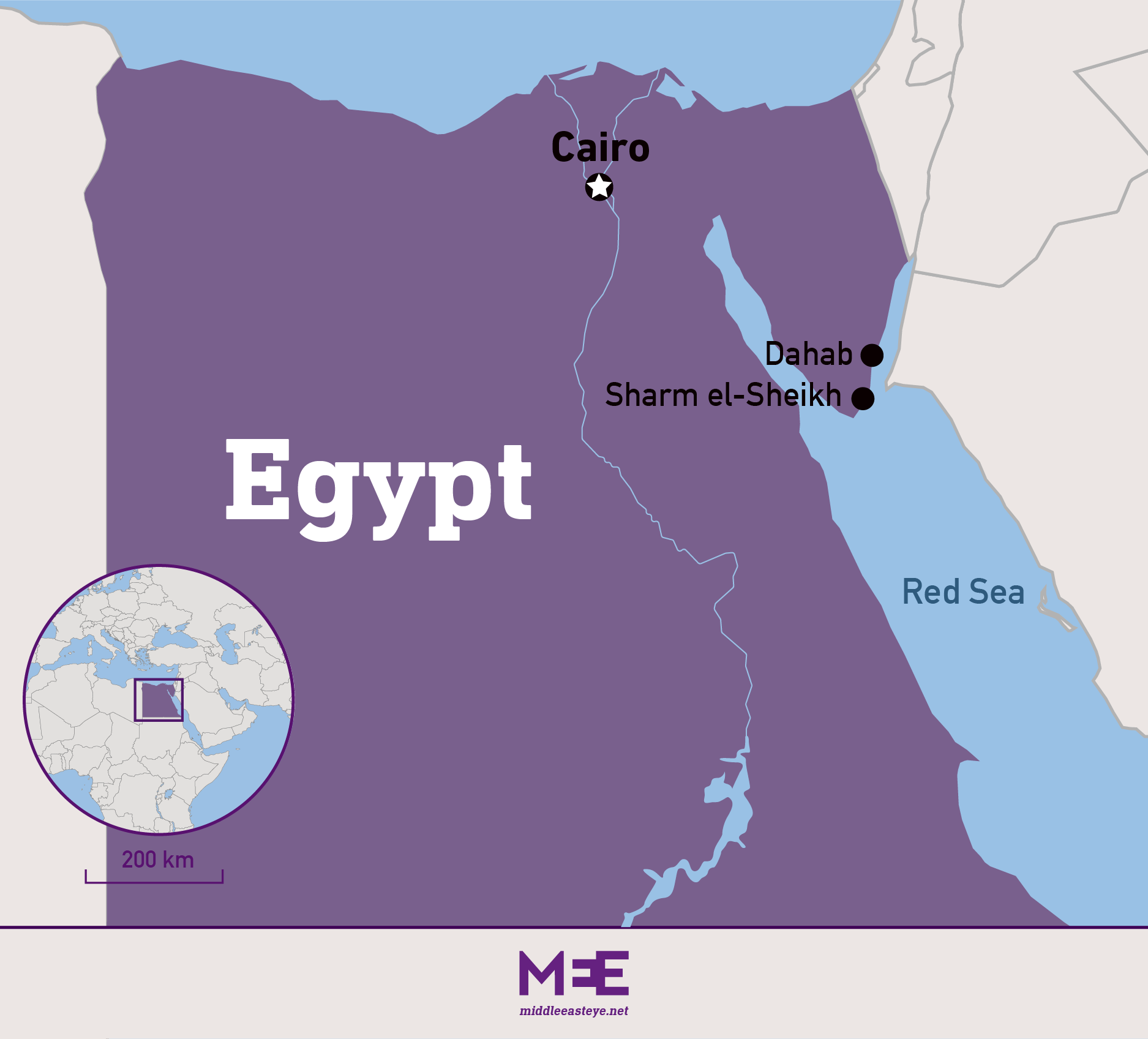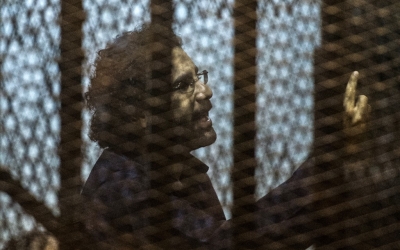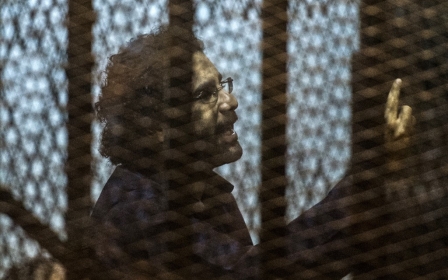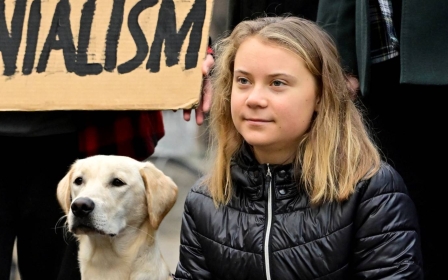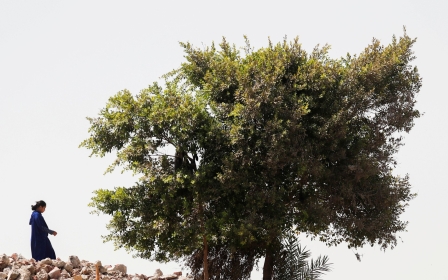Cop27: Egypt turns Sharm el-Sheikh into military fortress fearing possible dissent
With less than three weeks until Egypt hosts the UN annual conference on climate change (Cop27) in Sharm el-Sheikh, residents say the South Sinai city and its surrounding areas have turned into what looks like "a war zone" with security measures allegedly aimed at securing the event.
The measures coincide with online calls for anti-government protests on 11 November, the sixth day of the climate summit due to be held in Sharm el-Sheikh from 6 to 18 November.
'The amount of police and military in the city these days gives the impression that we are in a war zone'
- Narges, gym owner
The resort is usually used by the Egyptian government to host peace talks and international conferences away from the busy Nile Delta.
On a regular day, getting to Sharm el-Sheikh is very difficult for Egyptians, even for those who work there or local tourists, due to the number of military checkpoints that stop all cars and search all passengers en route to the area.
Middle East Eye spoke to several residents of the city who cited restrictive security measures that have disrupted their lives, including cancellation of events, forcibly returning non-Sharm residents to their cities, tight surveillance at entrances and exits, and a notably increased number of plain-clothed policemen.
Abanoub, an owner of a grocery and diving equipment shop, was forced to close his shop.
"I was approached by two officers who threatened to close the shop for good due to lack of licences if I don't close it now."
Abanoub was told he can re-open after the conference is over. "November is a season for local tourism, and with the number of guests coming for the conference, it would have been a great chance to make good money."
The 34-year-old told MEE that several other shops were given the same warning: close for the time of the conference or close forever. "Some of these shops have been operating for years, but there are no criteria."
Asked whether having political opinions is linked to the closures, Abanoub said "none of these shop owners and workers and delivery boys know what the prime minister's name is".
Narges, a gym owner who legally employs three African refugees in her business, was shocked to hear that her colleagues had to travel back to Cairo, where their refugee cards are registered. "They were stopped while they were getting their breakfast, and were put in a car and deported to Cairo. I tried to investigate the situation but could not even get the authorities to admit that the incident happened."
"The amount of police and military in the city these days gives the impression that we are in a war zone," the business owner, who has been a resident of the city for 20 years, said.
While she was not approached by any authorities to close her business, Narges says she felt helpless towards her employees. "At the same time, I don't want to escalate the situation, which might lead to them and myself being subjected to more injustice."
ID checks
Aya, a student, resides in Dahab, an hour's drive from Sharm el-Sheikh, most of the year. She told MEE that she was stopped by the police while going home from her yoga class only to have her background checked.
"I was confronted by the police that I was arrested once in 2014 in an anti-government protest. They also questioned me whether I plan to visit Sharm el-Sheikh, or have any tendency to protest."
'This conference is just a big show of what the authorities want the foreigners to see: Egyptians living happily. But the reality is different'
- Aya, Dahab resident
While she was allowed to go to her house in Dahab, others were detained from the public transport she was taking. "Four males who looked like they were construction workers were stopped and taken into the police van," Aya said.
"Escaping trauma, I have left Cairo in order not to witness such scenes of arrests and illegal harassment by the police. But it seems South Sinai will be militarised till the conference ends," Aya said, adding that "this conference is just a big show of what the authorities want the foreigners to see: Egyptians living happily. But the reality is different."
Hotels and hostels are fully booked in Sharm el-Sheikh due to the need to accommodate hundreds of guests from all over the world on the occasion of Cop27.
Two hotel workers told Middle East Eye that hotel police officers check all passports and all reservations, and every hotel has an on-duty National Security Agency officer in the lobby to monitor the arrival and departure of guests.
A French freelance journalist who spoke to Middle East Eye on condition of anonymity said that she arrived in Egypt days before the conference to spend time with her Egyptian partner and friends. In Dahab, where she was staying, she was stopped by plainclothes policemen who refused to show their identity.
"They asked me about my relationship with my boyfriend and told us that there are no hotels or campsites available in Dahab, and we, or rather only me, can come back during Cop27," she said, adding that they had a different line of questioning for her partner, such as whether he had been arrested before in any political protests. She said he was interrogated for an hour because he had memes about President Abdel Fattah el-Sisi in his phone gallery.
Restrictions on protests
Being stopped by the police and having one's phone searched is not new to Egyptians. Most recently, the technique was used in 2019 after calls for mass protests attracted widespread support.
Even in Cairo and Egypt's main squares, MEE has heard several testimonies about policemen stopping civilians to check their social media interactions and phone gallery in the weeks leading to Cop27.
The crackdown in South Sinai comes amid warnings by Egyptian and international rights groups that the rules announced by the government regarding designated places for protests during Cop27 are a threat to safeguarding freedom of assembly, an essential component of the annual summit.
Since Sisi ousted elected leader Mohamed Morsi in 2013, his government has banned demonstrations and jailed thousands for taking part in anti-government protests or sit-ins.
In a recent communique, a number of independent UN experts said that a "climate of fear" created by the Egyptian government will curtail the ability of Egyptian civil society groups to engage with Cop27.
The communique also warned against "lack of information and transparent accreditation criteria for Egyptian NGOs, a coordinated increase in hotel room rates, undue restrictions on freedom of peaceful assembly outside the conference venue, and unjustified delays in the provision of visas to those travelling from abroad".
MEE approached the UN Egypt office for a comment but has not received a response at the time of writing.
A spokesperson of the office of Major General Khaled Fouda, governor of South Sinai, told Middle East Eye that "any allegations about Egypt's ban on demonstrations in Sharm El-Sheikh during the Cop27 is untrue", stressing that the city includes an area where demonstrations are allowed.
The official said a large space will be dedicated to civilians and guests to practise their right to protest, adding that there will be "cafeterias, restaurants, and places for people to sit, talk, and have beverages to preserve the civilised image of the country".
The official, however, refused to answer any security-related questions, referring MEE to the security directorate, which was not available for comment.
In a televised interview with pro-government presenter Ahmed Moussa, Fouda said he had received 60 delegations from foreign embassies, whose questions revolved around the issue of allowing demonstrations. He added that "whoever wants to demonstrate [can] carry their own banner in the area designated for that. We [the officials] allow the matter, but if they make mistakes [break the law] such a situation is not allowed."
'Ruthless' security
A tribal source in one of South Sinai’s biggest families told MEE that security forces have met with them in recent weeks to intensify cooperation, enhance intelligence, and stop any "militant infiltrators from the mountains".
"Egyptian security is ruthless when it comes to securing international conferences. Middle-aged and elderly tribe members and their families remember how brutal the regime was when it cracked down on civilians after the 2005 Sharm el-Sheikh bombings."
'What you say is happening now [random searches and harassments] is a cakewalk to what used to happen before'
- Tribal source, South Sinai
The bombings at the time were claimed by the Abdullah Azzam Brigades, which was one of the first militant groups to operate in Sinai. Eighty-eight people were killed.
The tribesman himself was detained for seven months and was tortured to confess his relation to the militants, but was released in the end.
"What you say is happening now [random searches and harassments] is a cakewalk to what used to happen before," the tribal source told MEE, adding that a lot of the tribes are collaborating with the security apparatuses in order to prevent any attacks or dissent because they will be held as "scapegoats if anything happens".
Since 2011, few militant operations have reached South Sinai, as most of the insurgency has been taking place in North and central Sinai. Following the retreat of Israeli forces from Sinai after the 1979 peace treaty, Egypt's military intelligence services intensified cooperation and economic integration of South Sinai tribes, unlike tribes in the North.
The last attack in South Sinai, where Sharm El-Sheikh is located, took place in 2017 near the St. Catherine's Monastery where gunmen attacked security forces killing two officers and injuring five.
This article is available in French on Middle East Eye French edition.
Middle East Eye propose une couverture et une analyse indépendantes et incomparables du Moyen-Orient, de l’Afrique du Nord et d’autres régions du monde. Pour en savoir plus sur la reprise de ce contenu et les frais qui s’appliquent, veuillez remplir ce formulaire [en anglais]. Pour en savoir plus sur MEE, cliquez ici [en anglais].


